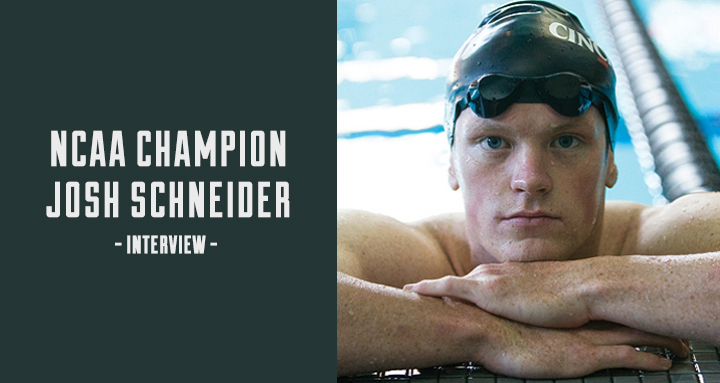Josh Schneider is a competitive Swimmer and assistant swimming coach at the University of Cincinnati he was a NCAA champion in 2010 after winning the 50-yard freestyle. Josh is currently training in hopes of getting a spot on the 2016 Men’s Olympic Swimming Team.

TF: How did you first get into swimming and what was it that really drew you to it as a sport?
JS: “I got into swimming because my sister was into it, and was really successful in high school. So when I got into highschool the swim coach approached me about joining the team, and I had two cousins on the team so it became a point of family pride and my family really got into it and enjoyed the culture of it.”
TF: What is the biggest impact a coach has ever had on you?
JS: “A coach once told me “You can let swimming identify you, but don’t let excelling at swimming cause you to not enjoy the other things going on around you.” When you’re swimming, be in the zone, but when you leave the pool you have to be able to leave your goals and such at practice and not carry it around with you otherwise it just drags your energy level down. You have to be able to turn it on and off.”
TF: Who would you say has been the most influential person in your swimming career?
JS: “Olympic coach Dave Marsh. He’s helped open up my mind more than anything else has.”
TF: What keeps you motivated to keep pushing yourself?
JS: “Working towards that olympic gold, and the doors that winning that open, on not only a personal level but also on a professional level for the goals I want to accomplish after swimming.”
TF: Do you have a specific routine you follow before a competition?
JS: “I have a skeleton of a warm up that I stick to before pretty much every competition, in conjunction with some supplements and stretches I do. One of the weird things I do is brush my teeth right before I swim to get that minty fresh breath before I take that big breath at the start of the race.”
TF: How do you feel you’ve grown and matured as a swimmer since you first started competing?
JS: “I’ve become a better learner, I’m very coachable now, after I didn’t make the olympic team I kinda humbled myself and took a step back, to really honestly look at what I’m doing compared to what my competitors are doing. I realized I’ve gotten more realistic with myself in terms of my weaknesses and looking at where I’ve been losing my races. I recognize how hard my goals are, and what I have to do to reach them.”
TF: You’re an assistant coach for UC Swimming, what was it like making the transition from a swimmer to a coach? What has coaching taught you since you started?
JS: “It was a pretty easy transition, I volunteered a lot last year when I was training so helping out with technique came fairly easily to me. It’s helped me improve as a swimmer because when I’m helping them correct their strokes it makes me think about my strokes a lot more and the process I go through a lot more in depth. So in teaching them I teach myself too.”
TF: How do you motivate your swimmers? What techniques do you use, and what have you found to be most effective?
JS: “It’s pretty easy to connect with them since I’m still swimming and training and with swimmers at such a high level they’re already pretty motivated so I usually help them address issues on a case by case basis.”
TF: What’s going through your head when you’re on the board, right before you dive into the water?
JS: “I’m really just psyching myself up, making sure I don’t let myself down.”
TF: What advice do you have for younger competitive swimmers?
JS: “Don’t let the sport consume you. Swimming is notorious for really secluding swimmers from the rest of reality and it can really become like a cult almost in a weird way. So don’t let it take over your life.”
TF: Do you ever visualize a race before it starts to get into the moment? If not do you use any other techniques you use before a race?
JS: “I visualize each race before it starts every time. Visualization is a powerful weapon and doing it correctly can make you a great athlete. I love it and it’s always been a really helpful tool in making me successful.”
TF: Has swimming started to lose it’s appeal at all after all these years or do you still have the same enthusiasm for it that you did when you first started?
JS: “It did in 2011 and 2012 after I didn’t make the US Olympic team. I went into a bit of a depression for 9 months trying to figure out my identity and what I wanted to do. Once I snapped out of that I really felt like I understood myself and the sport better and now I feel like I appreciate the sport more than ever. So it comes in waves I guess.”
TF: What’s the best experience you’ve had made possible by swimming?
JS: “I got to swim in Singapore this summer and stay in the Marina Bay Sands Hotel which has an endless pool on top of it. So getting to stay in such an amazing hotel was a great experience.”
TF: What are your hobbies outside of swimming?
JS: “Playing other sports, like basketball, volleyball, and softball, and playing with my dogs.”
TF: What are your favorite things to do around Cincinnati?
JS: “Going to bengals games, supporting UC sporting events, going to the banks. Anything sports related really.”